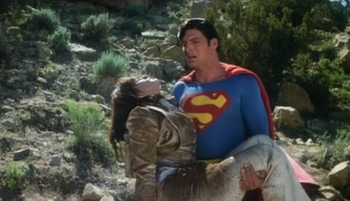 |
| l-r: Widran, Clinton, Sanders |
This is classic storytelling. Things are never easy for our screen heroes. If they were, their movies would be boring. Screenplays are about characters facing and overcoming obstacles.
At the end of The Wizard of Oz, Dorothy learns she had the power to go home all the time. Glinda could have told her so right from the start, but apparently there’s no such thing as a good witch. Instead, she sends Dorothy on a journey to the Emerald City. The heroine learns about reason, compassion, and courage from a trio of new friends she meets along the way. But when she arrives at her destination, the wizard doesn’t solve her problems as promised. Instead, he sends her on a second journey to face and kill her sworn enemy.

In the 1978 film Superman, Lex Luthor understands this intrinsically when he revels in the ill-timed arrival of of his rival, saying, “To commit the crime of the century, one would naturally want to face the challenge of the century.” Luthor is the villain, but like all well-developed villains, he behaves as though he is the hero in his own story. But he applies the same principle to the movie’s real hero, presenting him with the challenge of keeping the West Coast from falling into the ocean while simultaneously preventing a disaster of similar scope on the opposite end of the country. Oh, and before he can perform either of those heroic acts, he must break free from the deadly chunk of Kryptonite chained to his neck—while underwater.


The same is true if you’re writing a small indie movie. In Winter’s Bone, the hero, Ree Dolly, is ultimately handed the solution to her problem. As in The Wizard of Oz, the sisters could have saved her a lot of time and suffering by taking Ree to her father’s secret resting place up front. Instead, they force her on a journey. One by one, she tracks down and confronts her father’s associates, each one scarier than the last, until she stands face-to-face with the top dog. Only then, after navigating her version of the nine circles of hell, has she proven her perseverance and earned her enemy’s trust. Now when she’s given her prize, she is more prepared take on the hand she’s been dealt as the new head of her family.

ScripTipps TIP: Nothing ever comes easy to the hero.
ScripTipps TIP: The greater the challenge a hero faces, the more he deserves the reward.
ScripTipps TIP: Send your hero on a journey that prepares him to solve the problem that initially seemed hopeless.
ScripTipps TIP: A well-developed villain behaves as though he were the hero in his own story.
For a further deconstruction of the screenplays for Superman: The Movie and its sequel, with hundreds more screenwriting tips, read ScripTipps: Superman & Superman II.
No comments:
Post a Comment